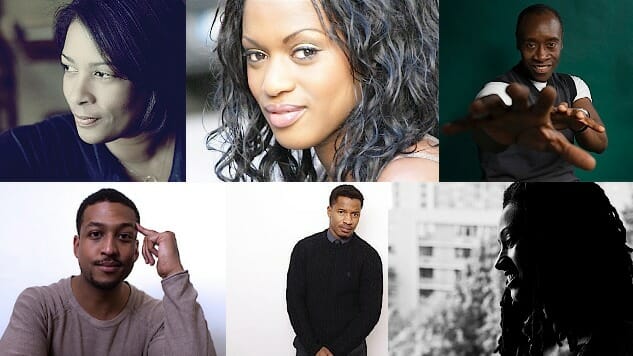10 Black Directors to Watch in 2016

Two years ago, we published our first list of 10 black directors to watch. A new filmmaker named Ryan Coogler sat atop that list, and he was joined by Justin Simien, Amma Asante (whose follow-up to Belle, titled A United Kingdom is in post-production) and Nailah Jefferson, who recently won a $50,000 grant from the New Orleans Film Society her next project. In my fantasy world, where the Oscars aren’t so white, and aren’t so male, everyone on that list (along with everyone on our women directors list would have had the success of Coogler, or at least the opportunities to create the big-budget film of their dreams—or even the low-budget film of their dreams. But it’s only 2016, and many black filmmaker (and black film-goer) dreams remain deferred. So here are 10 more black directors (presented without ranking, because all 10 are doing compelling work) you should watch—and by “watch” I mean follow on Twitter, support, contribute to, and more—in 2016. (On another note, I’ll add that there is clearly a problem in Hollywood when Googling “black women directors 2016” yields meager results for feature films that are being released this year. Let’s work on fixing that, altogether now.)
1. Dawn Porter

You know you’ve made a powerful documentary when police are hired to stand guard outside of screenings, and bags are checked for weapons at the door. It’s not a pretty image, especially coming out of the Sundance Film Festival—a certain emblem of artistic freedom and expression—but it’s the reality of Dawn Porter’s Trapped. A pro-abortion documentary premiering during a time when violent attacks on abortion clinics have become one of the many terrifying American norms, is exactly what the film world needs right now, and we need women like Porter to make them happen. Porter has said that she knew she needed to make this film after reading an article that stated there was only one abortion clinic in the entire state of Mississippi. And for Porter, the biggest stories about abortion clinics are not the acts of violent, domestic terrorism, but the legal actions that are being taken to calculatingly regulate abortion clinics in the deep South. Porter has stressed that this is not just a film about abortions, but a film about class and power in America. The filmmaker, who previously directed Gideon’s Army and Spies of Mississippi, is dedicated to exposing the structures that exist within the American justice system for no other reason than to strip marginalized citizens of their rights. Let’s hope that her work gets some much-deserved attention so that she can continue to de-marginalize these stories.
Follow Porter on Twitter. Follow news about Trappedhere.
2. Matthew A. Cherry

Partly inspired by last year’s much-beloved Tangerine, Matthew Cherry’s sophomore directorial effort, Nine Rides, is the first feature-length film shot on the iPhone 6s. Cherry, as both writer and director, will always have a rare perspective, as a former NFL player interested in the dynamics of race and class, particularly in terms of how they play out among people of color. Nine Rides only recently released a teaser trailer, and we don’t know much about the story, but it centers around a single night in the life of an Uber cab driver (played by Dorian Missick), whose world is about to change. Recently named as one of six directors with the chops to take on a Creed sequel in place of Ryan Coogler, Cherry has some big expectations to live up to. But something tells me that the footballer, turned production assistant, turned director can handle the pressure.
Follow Cherry on Twitter. Follow news about Nine Rideshere.
3. Andrew Dosunmu

You’re not supposed to judge a book by its cover, or a movie by its trailer, but Andrew Dosunmu creates the kinds of visually compelling works that inspire you to break this rule. The acclaimed filmmaker and photographer was celebrated for his 2013 Nigerian drama, Mother of George, (as well as for his debut, Restless City), and had his first solo NYC exhibit in 2014, “Andrew Dosunmu: Elsewhere – 10 years of photography.” This year, he’s teaming back up with past collaborator and Sundance Award-winning cinematographer Bradford Young to bring us the highly anticipated Beat-up Little Seagull, starring Babs Olusanmokun, Michelle Pfeiffer and Kiefer Sutherland.
4. Rita Coburn Whack

Whack’s Maya Angelou: And Still I Rise (co-directed by Bob Hercules) recently premiered at Sundance, and is the first feature documentary to tell the powerful story of a black woman poet, activist and survivor who transformed the culture. But you should also commit Whack’s name to memory for this excellent quote she gave to Indiewire about the realities of being a black woman director:
Whack is also an award-winning author and Emmy-winning producer, whose career began in broadcasting. Supporting her work means supporting the work of future renaissance women like her, and—although we’re taking this moment to highlight directors—it’s becoming abundantly clear that this industry needs more women of color “across all media,” making decisions about the future of entertainment.
Follow news about Maya Angelou: And Still I Risehere.
-

-

-

-

-

-

-

-

-

-

-

-

-

-

-

-

-

-

-

-

-

-

-

-

-

-

-

-

-

-

-

-

-

-

-

-

-

-

-

-














































